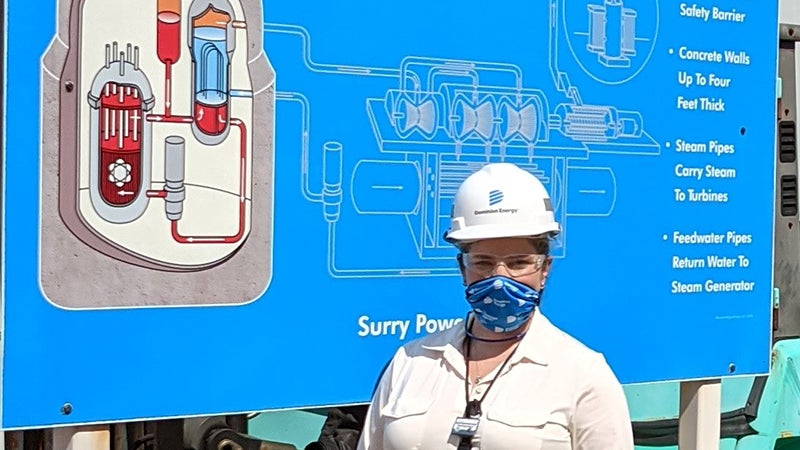Power plant leaders share what sparked their career
Published 5:39 pm Tuesday, March 30, 2021

- Adina LaFrance is the supervisor of primary, secondary and reactor engineering at Surry Nuclear Power Station. She’s also a Navy veteran who joined the military in 1997 and served for six years as an enlisted nuclear electrician’s mate, including time aboard the USS George Washington in Norfolk.
Adina LaFrance credits an eighth-science grade teacher for sparking her interest in a nuclear career.
“He’d put together his own lesson plan on nuclear power and energy supply and we spent maybe a week’s worth of class on it and I remember thinking how interesting it was and how unique it was, and we talked a lot about energy supply in that same context,” LaFrance recalled.
Her teacher got the educational materials from another teacher, who had gotten them from Dominion Energy.
After graduating from Kempsville High School in Virginia Beach, she joined the Navy’s nuclear power program and served for six years as an enlisted electrician’s mate, including time aboard the USS George Washington, which was based in Norfolk.
After her military service, LaFrance went on to Penn State University and received a degree in nuclear engineering. Now she’s the supervisor of primary, secondary and reactor engineering at Dominion’s Surry Nuclear Power Station. In that capacity, the people who work for her and with her are responsible for monitoring and supporting the power station’s reactor cooling system and the steam systems that move the turbine to produce electricity.
Joely Brockwell has a similar story. Having grown up in Smithfield, she didn’t think enjoying science and math might one day earn her the opportunity to work at the power station — a place where she went for school field trips.
While she was in college at Virginia Tech, a person she went to high school with was hired at Surry. That connection facilitated internships at the power station the summer after her sophomore and junior years of college. After graduating with a degree in chemical engineering in 2019, Brockwell said she hadn’t expected or planned to enter the nuclear field.
Now, as a fire protection and safe shutdown engineer, Brockwell will play an important role in an upcoming Nuclear Regulatory Commission inspection. A key part of her responsibilities is ensuring that the equipment used to keep the reactor and fuel cool is protected from fire.
About 900 people work at the power station, which is in Surry County on the south bank of the James River across from Historic Jamestown. The plant’s two nuclear reactors first went online in December 1972 and May 1973. Together, they produce about 14% of Virginia’s electricity. Dominion wants to operate the plant until 2053.
Melissa Pelletier is one of the 900. A Massachusetts native, she plays a key role in designing solutions to keep the facility operating safely and smoothly in her capacity as a nuclear engineer three in the electrical design and testing group.
“It’s an older plant, so if there’s an obsolete part, sometimes we’ve got to come up with a replacement or an enhancement to the plant to make the plant run better and more efficiently,” Pelletier said. She studied at the University of Massachusetts at Lowell. She went on to receive a degree in chemical engineering with a concentration in nuclear engineering.
She became interested after hearing a presentation on her university’s small, research-scale nuclear reactor. She went on to do an internship at Seabrook Nuclear Power Station in New Hampshire, “and that’s where my connection to nuclear energy started.” After college, she went to work for a firm that did work at nuclear facilities nationwide. And after about seven years with that company, which included working on Dominion projects, she began working at Surry.
According to the National Science Foundation, women received about half of all bachelor’s degrees, 44% of master’s degrees and 41% of doctoral degrees in science and engineering in 2016. That’s about the same as in 2006. The lowest degree shares are in computer sciences and engineering; the highest in psychology and biosciences. Engineering, according to the foundation, has one of the lowest shares of female degree recipients.
“Growing up as an engineer, going to college in the early ’90s, it was fairly typical we had about maybe 15% females, so you’re kind of used to that,” said Cathy Grady, who is the nuclear site services manager at Surry. “So when I go into a room and I’m the only female in the room, currently I don’t even think about that, it doesn’t cross my mind.” At the same time, she added, “I realize you’ve got to be aware enough that other people may recognize that.”
Grady has been with Dominion for about 25 years — first in 1992 as a student and permanently since 1997. As the nuclear site services manager, she oversees all on-site construction activities at the power station. Grady leads a team of about 45 people who work for Dominion at Surry, along with an additional 150 contractors. But during scheduled shutdowns for enhanced maintenance, she may be managing 500 people.
In the years since she began her career, “fortunately, what I’ve been able to see is more and more women being in the field and technical fields,” said Grady, who studied mechanical engineering at Virginia Tech. “Now rooms are filled with 35%, 40%, maybe 50% women. We have projects that are all women-led just by how it works out, just because we have such wonderful, outstanding women in my organization. It’s just wonderful to see.”
One project she’s currently overseeing is replacing cooling water intake pipes that are 8 feet in diameter.
From being immersed in the James River, the pipes can corrode over time. The existing carbon steel pipes are being replaced with carbon fiber and glass fiber reinforced pipes, which better resist corrosion. The project involves lifting the huge pipes and installing new supports and valves.
For young women who are interested in science, technology, engineering or math, Grady offered this advice:
“While I always made sure to reach out to find guidance from mentors and leaders in my area, I didn’t always have a lot of female role models, but I think an important key is to never hesitate or be reluctant to make your own path. When I switched from a more traditional engineering role to a maintenance supervisor, I was the first to make that jump, as both an engineer and a female, but it’s imperative to embrace those opportunities even when you are the first to do so. Amazing things could be ahead.”
Pelletier said it’s OK if you don’t know exactly what career path you want to pursue.
“I went into my college career somewhat undecided what I was going to do and I think that’s OK to be unsure. I was taking some classes in biology because it interested me, some classes in chemical engineering because it interested me, and ultimately I found what was my path,” she said.
Brockwell said her advice is “no matter what you choose to do, just always strive to continually do better at whatever it is. And even if you aren’t happy with whatever that position is, or that role or whatever you’re doing, it can open doors into something else. So I think as long as you work to be the best at what you’re doing, your options are endless for what you do in the future.”
LaFrance acknowledged that studying and succeeding in math and science can intimidate or even discourage people from pursuing their interests and dreams. Her advice and encouragement for anyone who wants to pursue a career in STEM is “assume you can — don’t assume you can’t. I think it’s important for someone to go, ‘Maybe I can’t do it right now but with a lot of hard work and a lot of study time and working through it and asking for some help, I can learn how to do this stuff.’”
And once on the job, LaFrance said when hard days happen, it’s important to remember what you enjoy about your career and what excites you. For her, that’s leading outreach tours where STEM and nuclear energy careers are introduced to the next generation.





